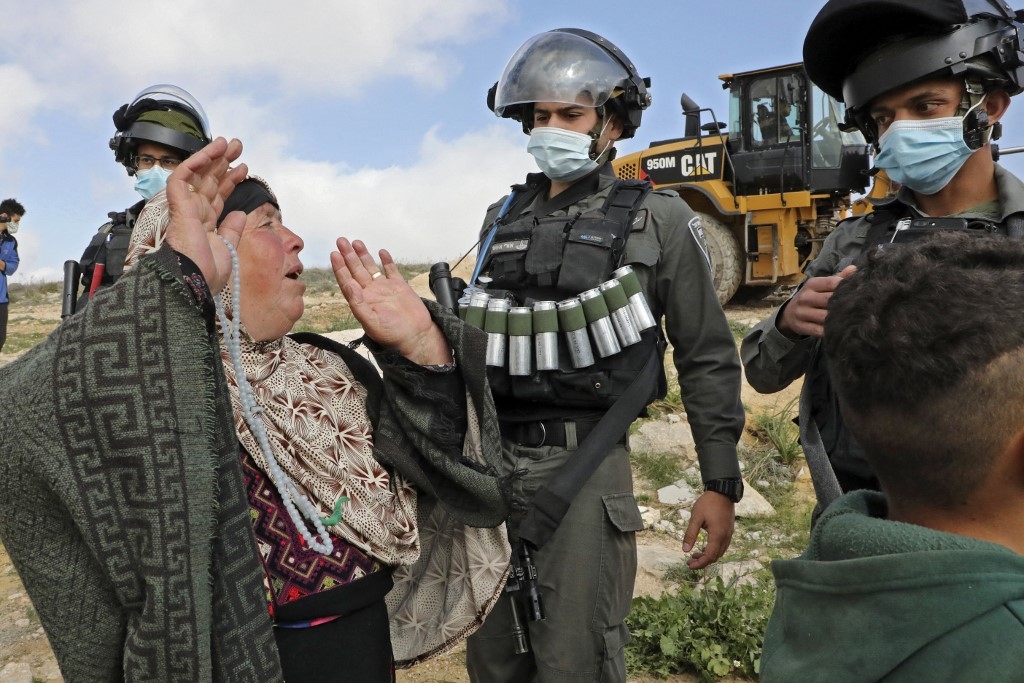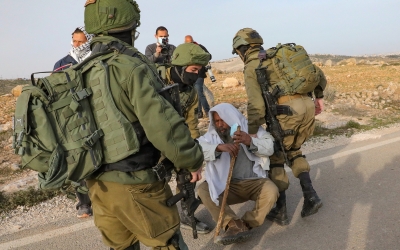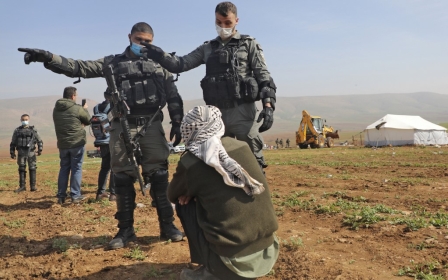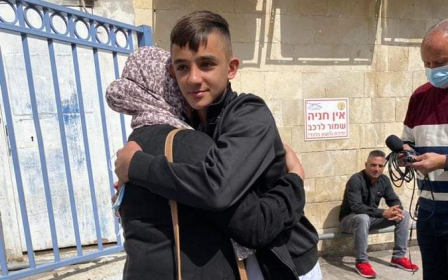Biden administration planning to 'reset' relations with Palestinians: Report

The Biden administration is looking to "reset" relations with the Palestinians following a turbulent four years under former President Donald Trump, according to a State Department memo obtained by The National and the Reuters news agency.
The internal draft memo, first reported by the UAE-based newspaper and later by Reuters, said the plan was still in an early "working stage", but included an initiative set to provide $15m in Covid-19 aid that could reach the Palestinian Authority (PA) by the end of March.
The State Department did not return Middle East Eye's request for comment by the time of this article's publication.
According to the memo, part of the Biden team's plan also includes a strategy that would take a tougher stance on Israeli settlement activities and mentions efforts "to obtain a Palestinian commitment to end payments to individuals imprisoned (by Israel) for acts of terrorism".
Palestinians who have immediate family members that have been arrested by Israeli authorities receive a stipend from the Palestinian Liberation Organisation (PLO), not the PA. The value of the stipend depends on the length of the sentence dolled out by Israel's military court, which has a self-reported 99.74 percent conviction rate.
The payments have been a sticking point between the US and Palestinian leadership, as around 40 percent of the male Palestinian population has spent some time in Israeli prison, according to the PLO, making the payments a regular part of life among many Palestinian families.
The Biden approach
The Biden team's memo expressed concerns with the Trump approach to negotiating with the Palestinians, which was largely seen as heavily biased toward Israel.
Trump's gifts to Israel
+ Show - HideThe Trump administration's bombshell announcement that it no longer considers Israeli settlements in the occupied West Bank illegal under international law has sent shockwaves through the region.
But it's only the latest in a long line of unilateral gifts offered by Donald Trump to Israel since the president took up residence in the White House in January 2017.
Middle East Eye takes a look at how Trump has promoted Israeli interests at the expense of the Palestinians:
Pro-Israel aides: Friedman, Kushner and Greenblatt
From the first moment Trump stepped in the Oval Office he appointed a raft of aides with close ties to Israel and the settlement movement.
Two of the first, and most prominent, tasked with dealing with the Israel-Palestine conflict were Jared Kushner, his son-in-law, and Jason Greenblatt, his personal lawyer.
Kushner and Greenblatt have been heavily involved in the so-called "deal of the century" peace plan, however their loyalties are heavily weighed in Israel's favour.
Kushner's family are close friends of Israeli Prime Minister Benjamin Netanyahu, and donated money to settlement organisations.
As Middle East envoy, Greenblatt, meanwhile, has consistently defended Israeli actions against Palestinians.
David Friedman, US ambassador to Israel, has been the Israelis' chief cheerleader since taking office in May 2017, telling the New York Times that “under certain circumstances, I think Israel has the right to retain some, but unlikely all, of the West Bank".
In July, Friedman and Greenblatt opened a highly controversial tunnel under the Palestinian neighbourhood of Silwan in occupied East Jerusalem.
The US ambassador was seen taking a hammer to a wall in the ancient archaeological site with particular zeal, in an event organised by settler group ELAD.
Recognising Jerusalem as Israel's capital
In a clear sign that Washington was prepared to upend years of convention and consensus in Israel's favour, Trump announced in December 2018 that the United States recognised Jerusalem as the Israeli capital.
East Jerusalem has been occupied since the 1967 Middle East war, and the Palestinians seek it as their capital of any future state.
The international community has maintained that Jerusalem's status must be agreed upon in a settlement between the Israelis and Palestinians, and in response to Trump's move 128 states condemned the decision in a UN General Assembly vote.
On 14 May 2018 - the 70th anniversary of Israel's founding - the US officially moved its embassy from Tel Aviv to Jerusalem.
Demonstrations erupted in the Gaza Strip and the West Bank, with Israeli forces killing at least 57 Palestinians as Kushner and his wife Ivanka Trump grinned at the embassy's opening.
Cutting funds for UNRWA
In early 2019, the US cut all funding to the UN agency that supports Palestinian refugees, UNRWA, saying its business model and fiscal practices were of an "irredeemably flawed operation".
UNRWA provides services to about five million Palestinian refugees, with the US a significant donor since the agency's founding following the 1948 creation of Israel.
In 2018, Washington gave UNRWA $125m in aid, and the agency has scrambled to make up for the sudden shortage.
The Golan Heights
In another unilateral decision, Trump in March announced that the US recognised Israeli sovereignty over the occupied Golan Heights.
The Golan was captured from Syria in 1967 and is both highly strategic and resource-rich. The majority of its inhabitants are Syrian Druze, who largely refuse to engage with Israeli rule.
Some 20,000 illegal Israeli settlers also live on the plateau.
Trump's decree was a gift to Israeli Prime Minister Benjamin Netanyahu ahead of the April elections, and was signed in his presence alongside Friedman, Greenblatt and Kushner.
Since President Joe Biden took office on 20 January, the administration has pledged to resume hundreds of millions of dollars in economic and humanitarian assistance and work towards reopening the Palestinians’ diplomatic mission in Washington, all of which were halted under Trump.
Biden's aides have also made clear they want to re-establish the goal of a negotiated two-state solution as a priority in US policy on the Israeli-Palestinian conflict.
Still, the administration has moved cautiously with Israel's 23 March elections looming, followed by Palestinian elections scheduled in the coming months.
A portion of the draft memo quoted by The National said the US vision is "to advance freedom, security, and prosperity for both Israelis and Palestinians in the immediate term".
One source, speaking on condition of anonymity, said the document was a preliminary draft subject to revision and any final version would require inter-agency review.
"We don't have any comments on that specific memo," US State Department spokeswoman Jalina Porter told reporters at a daily briefing, as cited by Reuters.
Middle East Eye delivers independent and unrivalled coverage and analysis of the Middle East, North Africa and beyond. To learn more about republishing this content and the associated fees, please fill out this form. More about MEE can be found here.





